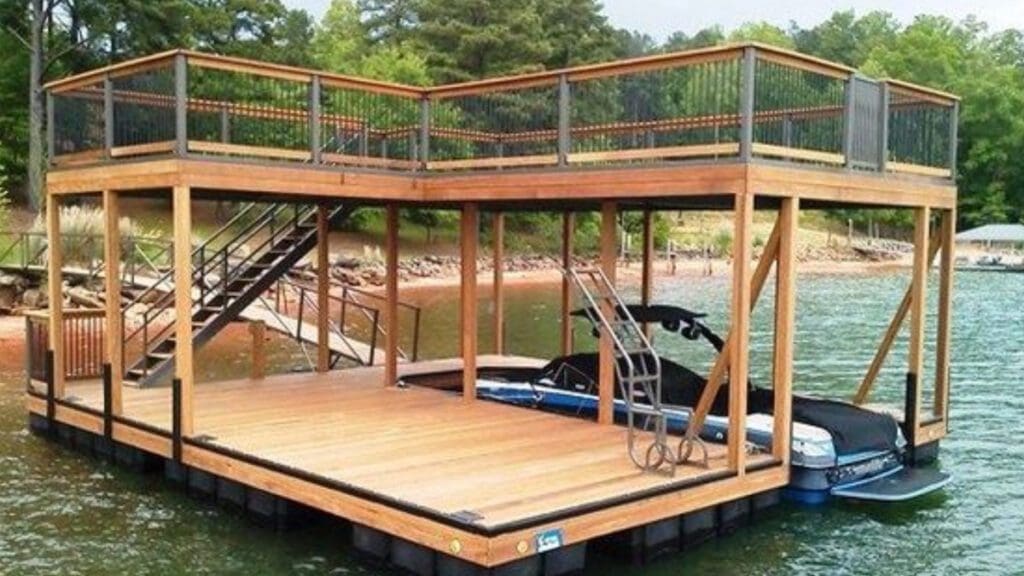Docking Station: Types of Fixed & Floating Dock Materials

Choosing a docking station is more than just selecting a design that is visually appealing to you. The material type you will use to construct your docking station is crucial in the design of your dock. To make sure that you will have the best water-side station, you should consider factors like cost, environmental impacts, damage risks, upkeep, and durability.
Luckily, you have a lot of options when building either a fixed or floating dock. Wood, plastic, and aluminum are the three most popular materials for dock decking which you would want to consider. Though these three can all provide you with reliable and sturdy platforms, they offer different benefits. In this article, we will discuss each of these materials based on the factors mentioned above.
#1 Wood Docks
Below are the things you need to know about wooden docks:
Cost
The price of new dock decking materials will depend on what type of wood you will use. Hardwoods and cedars can range from $3.00 to $7.5/square foot. On the other hand, synthetic woods are much more expensive and can reach up to $40/square foot.
Environmental Impacts
Wood materials are 100% renewable resources and they produce less water and air pollution compared to other decking options. But, woods that have been pressure-treated can pollute the water.
Damage Risks
Termites are the most common threats to wooden docks and decking. But, there are other insect types that can cause damage to untreated wood like powderpost beetles, carpenter ants, and carpenter bees.
Upkeep
Sealing and painting wooden docks are only temporary solutions. When wood is continuously exposed to saltwater, freshwater, or rain, it will eventually degrade and rot. Pressure-treated wood may also require preventive maintenance from time to time to prevent the components from degradation.
Durability
Wooden dock decking made from pressure-treated wood can last up to 15 years or more when well-maintained. However, wood will always rot, warp, split, or break even when regularly maintained.
#2 Plastic Docks
Make sure that you know the following details about plastic docks first before you build one:
Cost
Fixed aluminum and wooden docks are expensive in the long run but you can save more money in floating docks made of plastic. Aside from that, plastic docks are portable and are designed with maximum durability. Thus, your investment will be worth it and you do not need to worry about replacement parts and excessive repairs.
Environmental Impacts
While there are some metals or wood treatments that could pollute the water, Hiseadock’s eco-friendly plastic floating docks are made of recyclable superior plastic (HDPE) materials that will not harm the environment.
Damage Risks
You can secure stationary plastic docks to the water body’s floor or land for more stability. But, the disadvantage is that harsh weather, like rough waves and water swells, could knock your vessel against your dock. This could cause great damage. Using floating docks made of plastic can help you lessen the damages caused by hurricanes.
Upkeep
You can maintain plastic docks and decking easier compared to wooden and aluminum docks. You just need to clear the deck by sweeping it to retain your dock’s beauty. Use soap with water plus deck cleaners to clean it and remove stains. You can also use degreasing agents for household use.
Durability
Plastic docks are made from durable materials that last even when exposed in the water for a long time. Unlike wooden docks, polyethylene docks will not rot or break in both saltwater and freshwater settings.
#3 Aluminum Docks
Lastly, here are the characteristics of aluminum docks:
Cost
Docks made of aluminum materials are usually built by manufacturers beforehand and may cost higher initially. Aluminum decking can cost up to $10/square foot. They are among the most expensive dock material choices.
Environmental Impacts
Though the refinement and mining processes of ore use a lot of energy, you can recycle aluminum materials. You can almost reuse uncontaminated aluminum indefinitely.
Damage Risks
Aluminum docking stations have enough strength to withstand damage from watercraft impacts. However, aluminum docks could damage your vessel due to the strong impact.
Upkeep
While aluminum doesn’t rust, it corrodes but corrosion actually protects aluminum materials from rusting. But, though rusting is not a problem in aluminum docks, the dock’s structural integrity might be compromised. Corrosion causes the aluminum to become dull.
Durability
Aluminum frames can last for 30-50 years. They are weather and scratch-resistant and are unlikely to be influenced by environmental impacts, unlike wooden docks and decking. Moreover, aluminum materials are also much lighter compared to wood but they are stronger.
Conclusion
Now that you have learned about your different choices for your dock decking’s material, the next step is to build one. You can check out the articles below on how to build your own fixed or floating dock:
Hopefully, you were able to learn a lot from this short guide. Enjoy building your own docking station!
